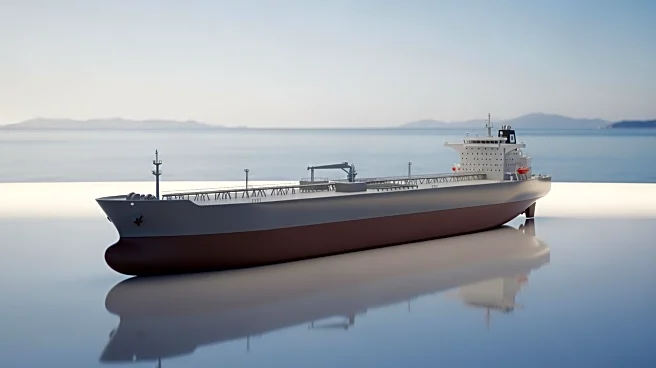What's Happening?
The tanker market has experienced a surge in activity due to increased sanctions enforcement, resilient oil demand, and growing OPEC+ supply. This has created a rate environment reminiscent of the early pandemic freight rate boom. Despite lower ordering
in 2025 compared to 2024, the overall tanker orderbook for delivery over the next three to five years has grown significantly, currently standing at 16% of the existing fleet. The market's strong cashflows have encouraged owners to consider fleet growth and renewal. However, the cyclical nature of tanker contracting and the unpredictability of future markets pose challenges for owners.
Why It's Important?
The high tanker orderbook reflects confidence in the current freight market, driven by strong demand and limited fleet growth. This situation presents opportunities for owners to capitalize on favorable rates and invest in fleet expansion. However, the cyclical nature of the market and uncertainties in long-term oil demand growth could pose risks. Excessive fleet growth may not be absorbed by growing ton-mile demand, potentially leading to oversupply and market instability. Stakeholders in the tanker industry must carefully assess market conditions and strategic investments to navigate potential challenges.
What's Next?
The tanker market may continue to experience fluctuations as geopolitical factors and oil demand dynamics evolve. Owners may need to balance fleet expansion with market uncertainties, considering factors such as sanctions relief and long-term demand trends. The industry may see increased focus on sustainability and technological advancements to enhance operational efficiency and reduce environmental impact. Stakeholders will likely monitor market developments closely to make informed decisions on fleet investments and strategic planning.
Beyond the Headlines
The tanker market's current boom highlights broader trends in global trade and energy dynamics. The emphasis on fleet expansion and renewal reflects ongoing efforts to adapt to changing market conditions and geopolitical challenges. The situation underscores the importance of strategic planning and risk management in the shipping industry, as stakeholders navigate complex and unpredictable market environments.















